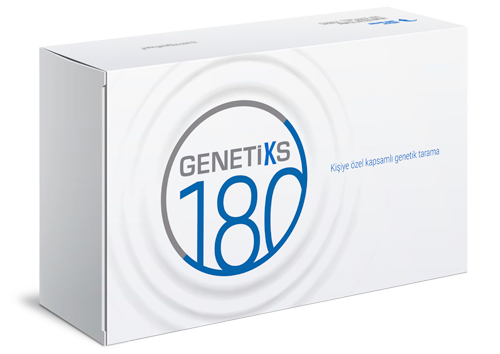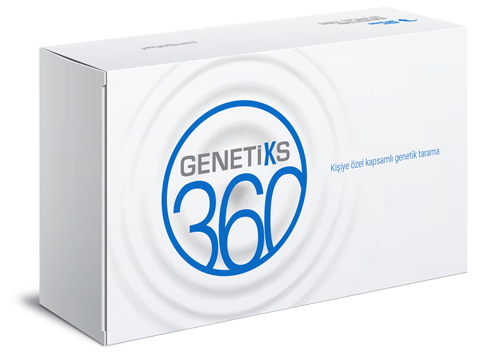Powered with Next Generation Sequencing (NGS) Technology
Prevention of genetic disorders has a key importance for the generation of healthy families. GENETIKS 180 and GENETIKS 360 provides the broadest carrier screening tests including both common genetic disorders such as SMA, Cystic Fibrosis, Fragile-X, DMD, Thalassemia and rare genetic disorders.
What is a genetic screening test?
It is a test that determines whether or not an individual carries a change in one of their genes and it provides information if they are at increased risk of having a child affected with a genetic disorder.
What is a recessive genetic disease?
The term "recessive" indicates that two copies of the mutated gene, one from each parent, are required for the disorder to manifest. Many carriers only discover their status when they marry someone carrying the same disorder, posing a risk of having an affected child. In families with carrier parents, 25% of their children may inherit both alleles, leading to the disorder. The chances of offspring being carriers or healthy non-carriers are 50% and 25%, respectively (see Figure 1).
What is an X-linked genetic disorder?
X-linked inheritance means the gene for a trait or disorder is on the X chromosome. Females have two X chromosomes, males have one. If the mother is a carrier of an X-linked disease, there's a 50% chance her male offspring will be affected. In some cases, female carriers may also show mild or severe forms of the disorder (see Figure 2).
According to large population studies, one in four individuals (25%) carries a severe genetic disorder. Among isolated ethnic groups and in communities with high consanguinity, couples may share the same genetic mutation, contributing to an elevated likelihood of carrying the same genetic mutation. Leading scientific authorities, including ACOGª, ESHREb, and ESHGc recommend carrier screening tests before marriage and childbirth.
Respected scientific authorities in America and Europe (ACOGa, ESHREb, ESHGc) recommend carrier testing for common genetic diseases, especially before marriage and birth3.
 |  |
Number of genes examined |
| 427 | ~22000 (all genes) |
Number of diseases evaluated SMA1, Frajil X2, DMD1, Thalassemia3, Cystic Fibrosis3
|
| >500 | >7000 |
Technique
|
| Next Generation Sequencing (NGS)* | Next Generation Sequencing (NGS)* |
Scope
|
| >20X %99.6 | 40X %96 , 100X %75 |
Who should have carrier testing?
|
| Premarital | Post Marriage + Consanguineous Marriage |
| - Before IVF treatment | - Couples with a family history of genetic diseases |
| - Before birth | - Couples who have children diagnosed with genetic diseases |
| - All couples who want to learn about their risks | - All individuals who want to find out if they are carriers for a genetic disease |
| Carrier screening is performed for more than 400 common and rare autosomal recessive and X-linked diseases that have a significant impact on morbidity and mortality within the scope of the panel established in accordance with ACMG guidelines. | Within the scope of the panel created in accordance with the ACMG guideline, more than 7000 genetic diseases associated with more than 22,000 genes, including CFTR, SMA, Fragile-X, DMD, HBB, which are common and rare and have a significant impact on morbidity and mortality, are screened. |
Variant positivity is confirmed by 1MLPA, 2rpPCR and 3Sanger sequencing methods. |
| Please see Table 1 for the scope of the panels. |
| |
Why Should I Get Carrier Testing?
- It allows individuals to determine their risks for hereditary diseases.
- It allows genetic selection in embryos with the preimplantation genetic diagnosis (PGT) method in the pre-pregnancy period.
- It allows prenatal diagnosis in the pre-natal period.
- It allows early diagnosis in newborns and children and the harmful effects of some genetic diseases to be reduced with diet, lifestyle or necessary treatments.
- It helps you to establish a healthy family in terms of genetic diseases.
- The most comprehensive carrier tests screening genetic diseases in line with ACMG Guidelines
- High resolution and coverage rates with next generation sequencing (NGS) technologies (>20X 99.6%, 40X 96%, 100X 75%)
- Use of additional confirmation methods such as MLPA, Sanger and rpPCR, which are considered gold standards for diseases such as SMA, Fragile X, DMD, Thalassemia and Cystic Fibrosis
- Results within a maximum of 4-6 weeks
- Can be worked on blood, saliva or buccal swab (oral epithelial cell) samples
Table 1: Some of the Single-Gene Diseases Covered in the GENETİKS 180 and 360 Carrier Screening Panels |
|---|
Alpha Thalassemia (HBA) | Ataxia-Telangiectasia |
Autosomal Recessive Polycystic Kidney Disease (PKHD1) | Beta Thalassemia (HBB) |
Biotinidase Deficiency | Charcot-Marie-Tooth Disease (PMP22) |
Congenital Adrenal Hyperplasia due to 21-Hydroxylase Deficiency (CYP21A2) | Cystic Fibrosis (CFTR) |
Duchenne Muscular Dystrophy (DMD) | Ehlers-Danlos-Like Syndrome Due to Tenascin-XDeficiency |
Familial Hyperinsulinism | Familial Mediterranean Fever (FMF) |
Fragile X Syndrome (FMR1) | Fraser Syndrome |
Gaucher Disease | Gitelman Syndrome |
Glutaric Aciduria, Type I | Hemophilia A (F8) |
Hereditary Fructose Intolerance | Homocystinuria due to Cystathionine Beta-SynthaseDeficiency |
Medium Chain Acyl-CoA Dehydrogenase (MCAD) Deficiency | Metachromatic Leukodystrophy |
Methylmalonic Aciduria - Methylmalonyl-CoA Mutase Deficiency | Non-Syndromic Hearing Loss Associated with GJB2 |
Phenylalanine Hydroxylase Deficiency (Phenylketonuria - PAH) | Pompe Disease |
Retinitis Pigmentosa | Short-Chain Acyl-CoA Dehydrogenase (SCAD) Deficiency |
Sickle Cell Disease (HBB) | SMA (Spinal Muscular Atrophy) |
Spinocerebellar Ataxia 10 | Tyrosinemia, Type 1 |
Very Long-Chain Acyl-CoA Dehydrogenase (VLCAD) Deficiency | Wilson Disease |
Xeroderma Pigmentosum, Group D | Tyrosinemia, Type 1 |
METHODOLOGY/VALIDATION
Sequence variants and small insertions/deletions:
Whole gene sequences (coding regions and adjacent intronic/splice regions) are covered by >99% of the bases with at least 20 independent sequence reads (20x) by using advanced NGS methods. Intronic and promoter mutations identified in ClinVar and Human Gene Mutation Database (HGMD) are targeted with >98% sensitivity.
Deletions/duplications (del/dup):
Copy number variants (deletions/duplications) are detected using advanced bioinformatics algorithms.
Pathogenic variants:
Pathogenic variants are confirmed additionally by Sanger sequencing, MLPA or quantitative PCR (qPCR) methods depending on the complexity of the genomic region.
Spinal Muscular Atrophy:
Copy number changes (CNV) in the SMN1 gene are screened by NGS and confirmed by multiple annealing looped primed amplification (MLPA) method. Point mutations for spinal muscular atrophy may not be covered due to high sequence homology.
Pseudogenes:
Proprietary bioinformatics tools are used to identify carrier mutations with highly similar inactive counterparts in disease genes (such as GBA for Gaucher disease and HBA1/HBA2 for alpha thalassemia).
REFERENCES
1 Lazarin GA, Haque IS, Nazareth S, et al. An empirical estimate of carrier frequencies for 400+ causal Mendelian variants: results from an ethnically diverse clinical sample of 23,453 individuals. Genet Med. 2013 Mar;15(3):178-86. doi: 10.1038/gim.2012.114.
2Nguengang Wakap S., Lambert D. M., Olry A., Rodwell C., Gueydan C., Lanneau V., et al. (2020). Estimating cumulative point prevalence of rare diseases: analysis of the orphanet database. Eur. J. Hum. Genet. 28 165–173.10.1038/s41431-019-0508-0.
3Committee Opinion No. 690: Carrier Screening in the Age of Genomic Medicine. Obstet Gynecol. 2017 Mar;129(3):e35-e40. doi: 10.1097/AOG.0000000000001951.